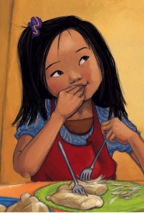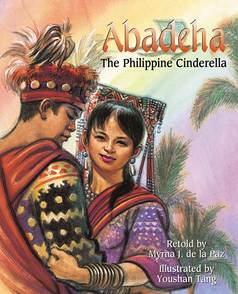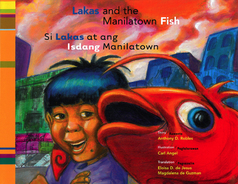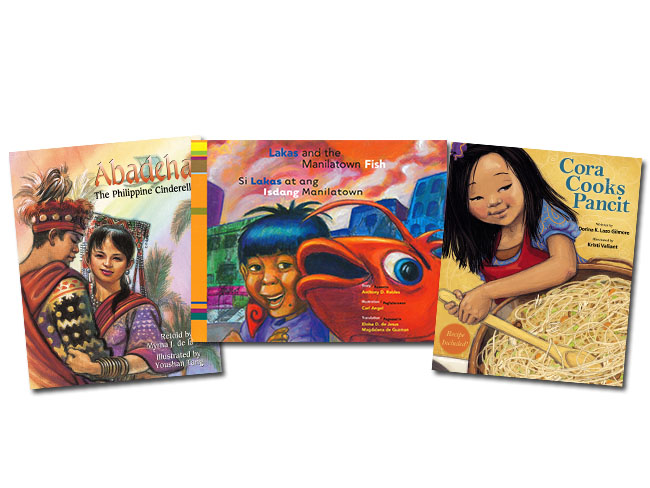 Pia Ceres was LEE & LOW’s summer intern. She is a recipient of the We Need Diverse Books Internship Program grant. She’s a senior at Brown University, where she studies Education & Comparative Literature, with a focus in French literature. When she’s not reading, you can find her watching classic horror movies from under a blanket, strumming pop songs on her ukulele, and listening to her grandparents’ stories about the Philippines. In this blog post, she describes a friendship she developed with a character, and highlights some of LEE & LOW’s Filipino titles.
Pia Ceres was LEE & LOW’s summer intern. She is a recipient of the We Need Diverse Books Internship Program grant. She’s a senior at Brown University, where she studies Education & Comparative Literature, with a focus in French literature. When she’s not reading, you can find her watching classic horror movies from under a blanket, strumming pop songs on her ukulele, and listening to her grandparents’ stories about the Philippines. In this blog post, she describes a friendship she developed with a character, and highlights some of LEE & LOW’s Filipino titles.
Do you know my friend Cora? I met her this summer.
Cora is the star of the picture book Cora Cooks Pancit, by Dorina Lazo Gilmore. She’s sweet, tan-skinned with a child’s moon-like face. She dreams of helping her mother cook Filipino dishes like adobo and lumpia and pancit, and one glorious day, she does just that. When Cora sits on the floor thinking about food while licking a spoon, I know we’re meant to be.
Of course, we make friends in books for reasons other than shared cultural experience. (Jo March, you’re my day one girl.) However, it’s increasingly critical that readers see their stories in books. When the values communicated in political rhetoric and popular culture can make a child feel ashamed or threatened for their differences, reflective stories provide crucial opportunity to help reframe their experiences in an affirming light.
When Mama asks Cora what she would like to cook, Cora “scrunched up her pug nose and began to think.” Memories of being teased about my low-bridged nose came tumbling back from time. But now, where there used to be shame, or longing for a Barbie doll’s features, Cora’s story creates the possibility of pride. She has a nose like me, and she’s smart, helpful, and adorable! At last, the positive mirror I didn’t even know I was waiting for until now.
So in the hope of inspiring conversation about taking pride in one’s heritage, and also recognizing the beauty of cultures different than one’s own, I’ve rounded up a few of LEE & LOW’s other Filipino and Filipino-American titles. With hope, they will be just the start of books that capture the Filipino/FilAm experience, making these stories accessible to all children.
Readers will be captivated by lush illustrations in this retelling of Cinderella, set in the little-represented world of the pre-colonial Philippines. Abadeha’s story begins as most Cinderella stories do, but what follows is an enchanting series of events that are deeply rooted in local mythologies. Magic takes unexpected forms, and fairytale fans will find Abadeha’s ending familiar, yet entirely new.
Abadeha: The Philippine Cinderella, by Myrna Paz, illus. by Youshan Tang
Purchase a copy of the book here.
A warm and whimsical Manilatown, San Francisco, is the setting for a young boy’s adventures catching a troublesome talking fish. As the slippery ectotherm whirls through the streets, townspeople join Lakas’s rag-tag fish-hunting band. The language is doubly musical, as the book is written in both Tagalog and English!
Lakas and the Manilatown Fish, by Anthony Robles, illus. by Carl Angel
Purchase a copy of the book here.
When his teacher announces a contest to see who can save the most play money, a baseball-loving Filipino American boy brings his father’s alkansiya, a bank made out of a hollow coconut shell, to school. Even though the bully mocks his “old, dusty shell,” Willie is determined to win the competition and learns an important lesson about his heritage. For any reader who has brought a part of their home culture with them to school and been teased (be it a packed lunch or article of clothing), this book is a reminder that where we come from makes us special.
Willie Wins, by Almira Astudillo Gilles, illus. by Carl Angel
Purchase a copy of the book here.
For more Filipino and Filipino-American books, check out our Philippines and Filipino Culture collection:
The quest for more diverse books never ends! Do you have any recommendations for books about the Filipino/FilAm experience? When was the first time you saw yourself in a book? Share in the comments below!













